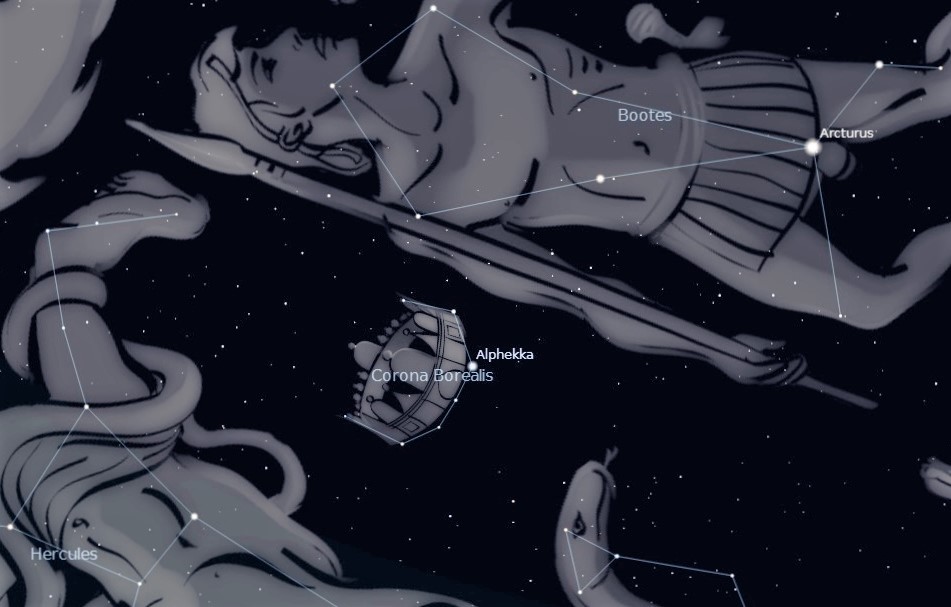This Week’s Sky at a Glance, 2023 April 15 – April 22

This Week’s Sky at a Glance, 2023 April 15 – April 22
One third of the way from Arcturus to Vega is a pretty semicircle of stars that makes up Corona Borealis, the Northern Crown. In the middle of the semicircle is the constellation’s brightest star, called Gemma (“jewel”) or Alphecca (“bright star of the broken ring”), among other names. About seven years ago the International Astronomical Union started approving official names for stars, and Alphecca was chosen over Gemma.
Some ancient societies regarded Corona Borealis as a begging bowl, and in local aboriginal legend it is the cave from which the bear (the bowl of the Big Dipper) emerges in spring. In Greek mythology it was a crown worn by Bacchus, the god of wine, who lived on the island of Naxos. Theseus, an Athenian prince, went to Crete as part of a group of youth who were to be placed in the labyrinth as food for the Minotaur. With the aid of Ariadne, the daughter of King Minos, Theseus slew the Minotaur and found his way out of the labyrinth. In love with Ariadne, he took her aboard to sail back to Athens. They stopped at Naxos where Bacchus also fell in love with Ariadne, and he made Theseus leave without her. To prove his love and his godliness to the skeptical Ariadne, he tossed the crown into the sky as a symbol of her beauty. Immortality and a lifetime supply of wine, who could pass that up?
This Week in the Solar System
Saturday’s sunrise in Moncton is at 6:33 am and sunset will occur at 8:06 pm, giving 13 hours, 33 minutes of daylight (6:39 am and 8:09 pm in Saint John). Next Saturday the Sun will rise at 6:20 am and set at 8:15 pm, giving 13 hours, 55 minutes of daylight (6:27 am and 8:18 pm in Saint John).
The Moon rises below Saturn Sunday morning, and the new moon occurs early Thursday. Look for a very slim crescent that evening. On Friday evening it is between Mercury and the Pleiades, and next Saturday the Moon is upper left of the Pleiades. Venus slides past the Hyades and by midweek it sets after 11 pm. Mars is moving through the middle of Gemini the Twins. Saturn is the lone naked-eye planet in the morning sky, rising just before 5 am this weekend. Early risers might see some meteors from the Lyrid shower late in the week.
On Sunday evening at 8 pm, tune in to the Sunday Night Astronomy Show via the Facebook page or YouTube channel of Astronomy by the Bay.
Questions? Contact Curt Nason
